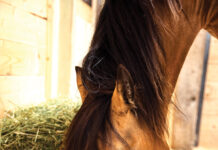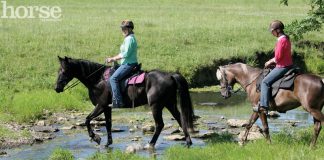

A: Like people, some horses are “messy” eaters and some are not (we all know that person who can’t seem to close their mouth when they chew!). But it’s still a good idea to have your veterinarian examine your horse and his mouth any time something doesn’t seem right or changes. There may be an underlying health issue that should be corrected before it becomes a much larger and more serious (and more expensive!) problem.
Depending on the age of the horse, a number of issues can lead to chewing problems. For example, in young horses who are replacing baby teeth with permanent teeth, retained “caps” can be a source of pain and discomfort causing them to chew differently. In older horses, loose, fractured, or infected teeth or gum disease could be the culprit of odd eating behavior. Of course, there are other signs besides dropping feed that may indicate a horse has a dental condition that needs attention, such as not eating; tilting the head; salivating more than usual; losing weight; developing a swelling, nasal discharge, or mouth odor; or performance issues. For any of these signs, the best advice is to have an exam performed by a vet to try and determine what is causing unusual behavior or other signs.





